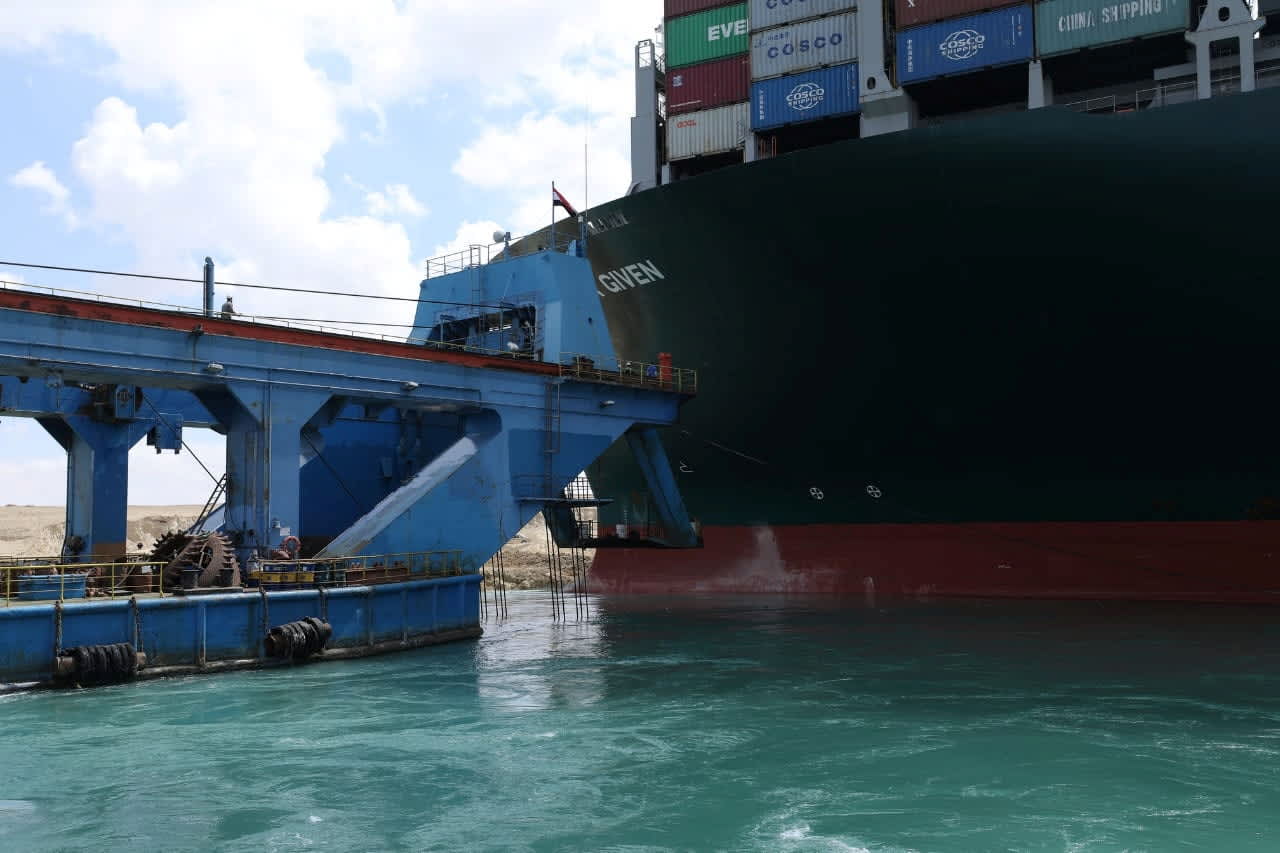Companies are scrambling to reroute shipping vessels to avoid the logjam at the Suez Canal, including at least two U.S. ships carrying natural gas for Cheniere and Shell/BG Group, according to data provided by MarineTraffic and ClipperData.
At least ten tankers and containerships are changing course as the Ever Given, one of the world’s largest containerships, remains stranded across the canal along Egypt, MarineTraffic spokesman Georgios Hatzimanolis told CNBC in an interview.
“We expect that number to go up as this closure progresses,” Hatzimanolis said.
The1,300-foot ship ran aground Tuesday enroute from Malaysia to the Port of Rotterdam in the Netherlands. The stranded ship has caused other vessels to back up in the canal, holding up roughly $400 million an hour in goods, according to Lloyd’s List shipping journal. That’s slowly increased over the last several days after repeated efforts by Egypt to refloat the 247,000-ton containership have failed. Officials there are using eight large tugboats and excavation equipment on the banks of the canal to dig out sand around the grounded vessel.
According to MarineTraffic, there are 97 vessels stuck in the upper portion of the canal, 23 vessels waiting in the middle and 108 vessels in the lower portion. The logjam stretches through the Red Sea, past the Gulf of Aden, all the way to the Border of Yemen and Oman.
“From Asia to Europe we are seeing ships divert in the Indian Ocean, just below the southern tip of Sri Lanka,” added Hatzimanolis. For Europe-bound ships coming from Asia, going around Africa instead of through the canal can add up to seven days to a ship’s journey, he said.
The Maran Gas Andros LNG tanker departed from Ingleside, Texas on March 19 loaded with Cheniere fuel and a carrying capacity of 170,000 cubic meters of liquified natural gas. The Pan Americas LNG tanker, which is carrying Shell/BG fuel, left Sabine Pass on March 17 and can carry up to 174,000 cubic meters of liquefied natural gas. Matt Smith, director of commodity research for ClipperData, confirmed which companies were using the ships.
Both tankers changed course in the middle of the North Atlantic Ocean before diverting to go around the Cape.
ClipperData also shows the Suezmax Marlin Santorini loaded with 700,000 barrels of Midland West Texas Intermediate crude oil diverting away from the canal. Smith said the original route to the Suez was an “unusual diversion.”
“The vast majority of U.S. crude exports avoid the Suez Canal, heading either to Europe or around the Cape of Good Hope to Asia instead,” Smith explained. The Suezmax Marlin was at Magellan’s Seabrook terminal in Houston, Texas, on March 10, where it was topped off with 330,000 barrels of West Texas light crude oil before heading to Galveston, Texas, the next day.
The vessel then left the U.S. declaring for Port Said in Northeast Egypt but took a turn south Thursday after passing the Azores Islands near Portugal. “The vessel is yet to update its declared destination,” said Smith.
ClipperData shows the number of fully loaded fuel tankers waiting off Port Said as well as the US Gulf Coast. As of Friday afternoon, another two tankers and a Suezmax, the largest tanker that can navigate the Suez Canal, carrying vacuum gasoil from the U.S. were passing Crete and set to anchor offshore Egypt.
Another ship, the HMM Rotterdam containership, turned away from the canal just prior to entering the Strait of Gibraltar, changing course to go around Africa.
Peter Sand, chief shipping analyst at BIMCO said the diversion pattern is similar among other vessels.
“We are seeing not only containerships rerouting in both directions but also LNG carriers and dry bulkers from U.S. Gulf of Mexico,” said Sand. “The vessels are taking a sharp turn to the right in the middle of the Atlantic to head south towards the Cape of Good Hope to avoid the logjam around Suez.”
Kevin Book, managing director of ClearView Energy Partners says while a long Suez interruption introduces latency into the supply system, for liquified natural gas, the length of the delay depends on where the ship started, where it’s headed and where in the journey it changed course.
“For U.S. Gulf exporters, going around the horn it only adds three days or less at sea to Tokyo Harbor,” Book said. “For cargoes from Doha to Northwest Europe, that route could tack on ten days onto the trip.”
Cargo that originated in the Gulf of Mexico and gets stuck in the Mediterranean can face a ten-day diversion instead of three, he said.
At the time of publication, Cheniere and Shell/BG did respond to CNBC’s request for comment.
MSC Mediterranean Shipping Company said 11 of its vessels were being re-routed, 19 ships were anchored on either side of the canal and two vessels being turned back as of Friday afternoon.
The Suez Canal blockage is one of the “biggest disruptions to global trade in recent years,” MSC Senior Vice President Caroline Becquart said in an email Saturday.
“We envisage the second quarter of 2021 being more disrupted than the first three months, and perhaps even more challenging than it was at the end of last year,” she said. “Companies should expect the Suez blockage to lead to a constriction in shipping capacity and equipment, and consequently, some deterioration in supply chain reliability issues over the coming months.”
